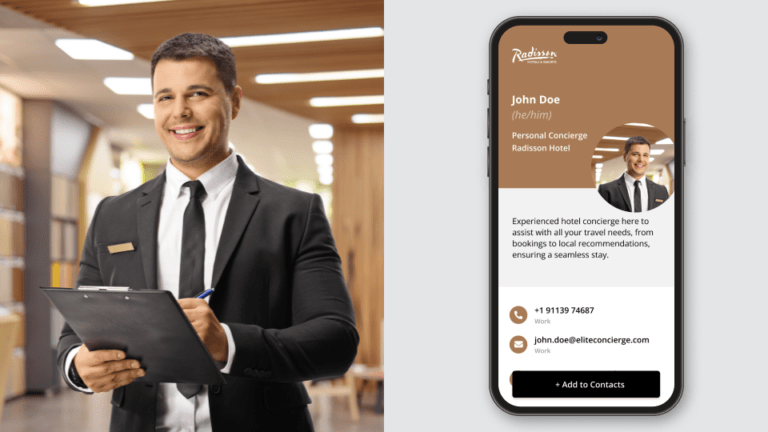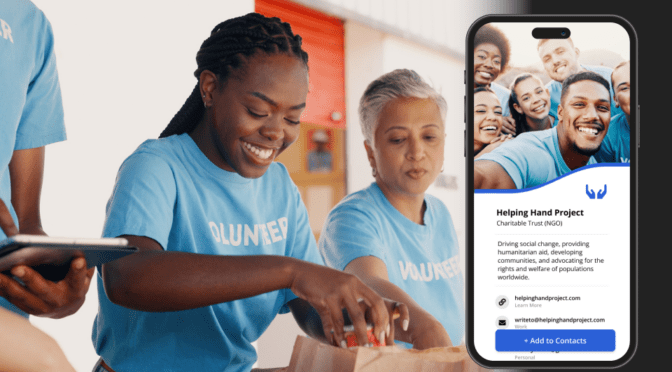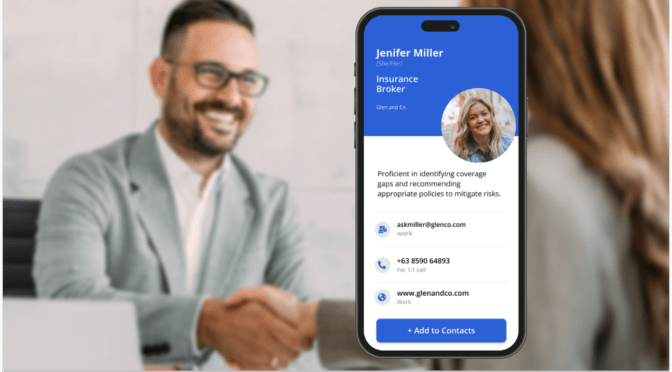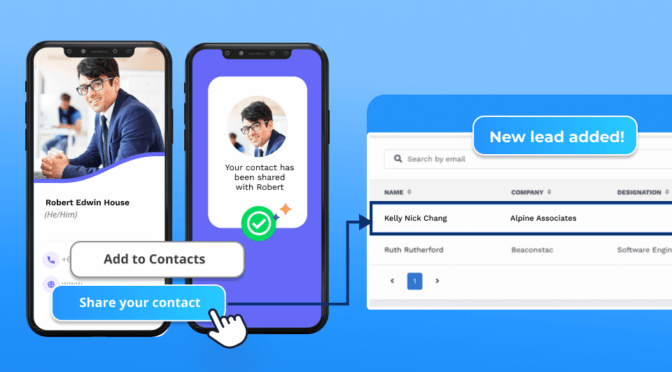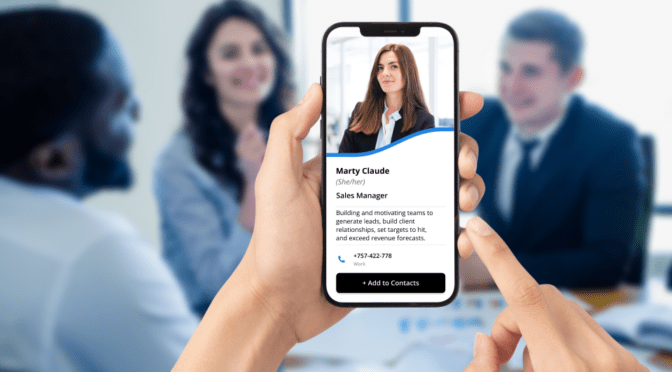Digital business cards are not just contact-sharing tools. In hospitality, you can use them to create moments of guest delight—from welcoming guests at the front desk to delivering concierge services and many more.
With virtual cards, you can ditch old-school ways of guest interaction involving disparate channels of communication. Instead, think of a one-stop digital touchpoint that can work as an e-contact card for your team members, vendor relationships, and networking while delivering a superior communication experience to your guests.
In this guide, I’ll give you a complete rundown for using digital business cards for hospitality brands.
Table of contents
- Does hospitality need digital business cards
- 5 ways to use digital business cards for hospitality
- Create digital business cards to improve hospitality experiences
- Frequently asked questions
Food for thought: Does hospitality need digital business cards?
Before creating dozens of virtual business cards, you may wonder if investing in a digital solution is even worth it.
Here are four ways hospitality brands can get a good ROI from digital cards:
1. Conveniently share information
A benefit of using digital business cards for hospitality is the convenience of sharing information with guests from arrival.
Instead of asking customers to dial the front desk whenever they need help, you can share a dedicated staff member’s e-contact card. This personalized experience will give your guests a hassle-free way to seek help or advice throughout their stay.
You can also add links for helpful resources, such as a calendar for booking amenities at your property.
🔥Go paperless and smart: Share a relevant staff member’s digital business card with your guests before they check in to offer proactive assistance and address concerns. Swap your paper card stack on the reception with a tent card or a stand containing digital business card QR Codes.
2. Enhance sustainability and cost-effectiveness

Digital business cards reduce paper waste and eliminate printing and shipping costs associated with physical collaterals. You can customize these cards anytime without spending more on reprinting and logistics.
Digital cards are a more sustainable and budget-friendly than paper cards. Plus, you can highlight your brand’s commitment to sustainability when reducing paper usage. This brand positioning will resonate with eco-conscious people who prefer sustainable choices.
3. Integrate with your CRM
Unlike traditional business cards, digital cards go beyond just contact sharing.
You can integrate your business cards with a CRM platform (such as Zoho, Freshworks, Salesforce, etc) to track how guests interact with these cards.
Look at metrics such as number of views, click-through rates, and contacts saved to create more customer-focused cards.
Digital business cards also allow two-way contact-sharing. This means that the same card you share can also capture leads. So, it’s easier to build a guest database and enhance your marketing campaigns. You can use this database to:
- Share updates about your property
- Send exclusive discounts and deals
- Offer invites for events at your property
- Gather feedback to improve your offerings
- Share recommendations for their next trip
With a guest database, you can engage your customers and keep them returning more consistently.
🔥Pro tip: Capture your guests’ contact details and build a database with Uniqode’s digital address book. Enable two-way contact-sharing in your business cards. When your guests scan them, they can voluntarily share their contact details.
Captured contacts will flow into the digital address book (which is like a mini CRM). You can sync this address book with your CRM platform to launch tailored marketing campaigns.

4. Promote your brand organically
Digital business cards can be your brand’s differentiators and help create a strong customer impression. It’s all about how you use the cards.
For example, add links to your brand’s story, property tours, and social proof to gain your customers’ confidence without over-the-top marketing.
Besides sharing contact details, branded business cards can provide direct access to booking portals, special offers, and loyalty programs. The result? Your guests can seamlessly access different amenities and feel valued.
You can build a referral program encouraging guests to share your cards with others and win special discounts. Another way to increase visibility through organic marketing is to add these cards to your website and email campaigns.
5 creative ways to use digital business cards for hospitality
Now that I’ve clued you in on why you need digital business cards, let me break down all the unique ways you can use these cards in your hospitality business:
1. Improve the guest experience
You can create digital business cards for every staff member—from the front desk to the restaurant manager and other departments—so that the right person is always available to tend to guests when needed.
The easiest way to do this is to share a digital card at the front desk during check-in. This way, guests will automatically have the required person’s contact details, say, a property manager’s, saved on their phones, which goes a long way to making a solid first impression.
Guests can conveniently contact the required staff—from the front desk to the concierge—to resolve concerns, make appointments, and get more done.
👉🏻 How to get started
- Create shift-wise cards: Design digital business cards for staff members available at the front desk during different shifts. Add a contact number, messaging link, and availability hours to offer round-the-clock support.
- Train your staff: Ensure your staff knows how to use and share digital business cards to assist guests efficiently. You can create and test these digital cards to eliminate any scope for error and confusion.
2. Deliver seamless concierge services

High-end hospitality businesses work with concierges to ensure guests have a pleasant experience. A concierge caters to all your guests’ needs—from recommending places to visit to arranging transportation and more.
Your concierge(s) can use digital business cards to share personalized recommendations for local attractions, events, dining options, etc. They can also update this information in real time to accommodate seasonal changes.
Even if you don’t have a designated concierge staff, you can share a digital card with all the relevant links to help guests make the best of their stay.
For example, as an Airbnb host, you can share your digital business card in the welcome kit (or from your mobile device during an in-person meeting). Encourage guests to check out different links to learn insider information about your property and neighborhood.
👉🏻 How to get started
- Add to welcome kits: Create a digital welcome kit with all the information about your property and digital cards. You can also add a QR Code for your concierge’s card in each room’s minibar.
- Curate recommendations: Your cards should include links to updated lists of local attractions, dining options, leisure activities, and events. You can create landing pages for seasonal local experiences, such as Oktoberfest in Munich.
- Provide real-time updates: Let concierges update recommendations on their digital cards as needed. This will prevent confusion among guests and give them the latest information about recreational experiences.
3. Create premium interactions
Another creative use case for digital business cards in the hospitality sector is to share exclusive access to your property’s key figures, like the head chef, head of sales, and even the manager.
This will create a premium experience for high-profile guests and give them a behind-the-scenes view of your business. You can share these digital business cards with VIP guests to create a sense of exclusivity and allow them to build special connections with your business.
For example, you can share your executive chef’s business card with guests celebrating a personal milestone at your hotel, like an anniversary. The guest can directly contact the chef to customize their dinner and plan a more curated experience.

Building high-end touchpoints works well for winning guests’ confidence and loyalty. It shows your commitment to guest satisfaction and makes people feel valued with these personalized connections.
👉🏻 How to get started
- Identify key figures in your staff: Find the relevant staff members with whom your guests would like to interact, such as the spa manager, hospitality director, and head chef. Create personalized digital cards for them with their role, images, contact information, and crucial links.
- Create opportunities for exclusivity: Incorporate specific moments within your guest experience to introduce these exceptional interaction opportunities. For example, you can share these digital cards with guests booking premium rooms or during high-end events organized at your property.
4. Maximize reviews and referrals
Digital business cards can also help you collect testimonials and facilitate direct bookings for your property if you have a relevant link to do so.
For example, during checkout, you can ask your guests to use the digital business card they scanned earlier to leave a review.
Besides a review request, include a referral link that guests can share with others to book a stay at your property. Guests who share the URL will receive a referral discount for their next visit to your hotel.
You can add a sales representative’s digital business card to answer any questions for these guests. Guests can contact the property and speak to a specific person instead of dialing a random number they find on Google.
This tactic can effectively reduce reliance on online travel agency (OTA) platforms to get more bookings. Plus, you can save on commission fees paid to these platforms and offer that as a discount to delight your customers. It’s a win-win!
👉🏻 How to get started
- Share cards at checkout: If you haven’t shared a digital business card during a guest’s stay, share it during checkout. For example, you can share a sales staff member’s digital business cards with the checkout bill. Verbally remind the departing guests to leave reviews and book future stays with a discount from the same card.
- Incentivize sharing: Offer discounts or special deals to guests who share your digital card with others. Add a link to a landing page explaining this referral program in detail.
- Include review links: Your digital cards must include links to popular review sites (such as TripAdvisor) to make it easy for guests to leave feedback.
5. Establish and nurture connections with vendors
Strong vendor relationships are essential for running a successful business in hospitality.
Digital business cards offer a great way to introduce yourself to new vendors, collect their contact details, and establish a relationship with them. Here’s how:
Let’s say you’re at a trade show, meeting with various vendors—from event managers to photographers and more. You can share your virtual cards with a QR Code, Google Wallet, or Apple Wallet pass without wasting too much of the recipient’s time.
Make your card as comprehensive as possible by including links to:
- Purchasing policies
- Procurement process
- Current supply needs
- Required certifications
This gives vendors all the information they need to approach you with an offer. Plus, with two-way contact-sharing, you can easily collect vendors’ details and build a database with.
Access the vendor database anytime you want to onboard a new vendor or manage your connections in the long run. For example, with Uniqode’s Contact Manager, you can view all your contacts in one place and export the list to your CRM or any other app in one click.
👉🏻 How to get started
- Distribute at trade shows: Share your digital business cards with folks you meet at industry events. Add links to your procurement processes and certifications when meeting vendors at industry events.
- Collect vendor contacts: Use two-way contact-sharing to capture vendors’ details from your card. Build a digital address book of vendor contacts for future needs.
- Update regularly: Set up a workflow to constantly update information in your digital business card. Incorporate any changes in your purchasing policies or requirements.
Create digital business cards for hospitality to improve guest experience
In hospitality, an interaction can make or break your customer experience. Digital business cards are one of the many innovations changing how hospitality brands engage with customers and deliver a memorable experience.
You can create digital business cards to uninterruptedly share information with your guests while saving costs for printing paper cards.
Check out Uniqode to create, launch, and track your digital cards effortlessly. Create cards for your entire staff, appeal to a global audience with multilingual cards, and integrate Uniqode into your marketing tech stack.

Frequently asked questions
1. How can digital business cards enhance customer engagement in the hospitality industry?
Digital business cards can enhance customer engagement by offering instant access to key personnel such as hotel managers, chefs, and concierge staff. They can be shared via QR Codes so guests can quickly connect, ask questions, or make requests. Digital business cards also allow personalized follow-up communication, improving guest satisfaction and fostering long-term relationships.
2. What are some critical details for hospitality professionals to include on a digital business card?
Here are some of the essential details to include on a digital business card for hospitality professionals:
- Contact information with clickable links (phone, email)
- QR Code for easy sharing or linking to a website
- Integration with CRM or guest management systems
- Quick access to services, menus, or event calendars
- Option to schedule meetings or reservations directly
3. How do digital business cards compare to traditional paper business cards regarding cost and efficiency?
Digital business cards are generally more cost-effective and efficient than traditional paper cards. They eliminate printing costs, and you can update them without reprinting.
Additionally, digital cards offer real-time sharing through various online platforms, ensuring the recipient always has up-to-date information. Digital cards also contribute to sustainability efforts by reducing paper waste.
4. Can digital business cards be integrated with existing CRM systems in the hospitality sector?
Yes, you can integrate digital business cards with a CRM platform—such as Pipedrive, Freshworks, and Salesforce—to transfer guest data into your system. This lets hospitality businesses track guest preferences, interactions, and feedback. You can use these insights to deliver a more personalized experience.
5. What are some creative design ideas for digital business cards in the hospitality industry?
Here are some creative design ideas for creating a digital business card:
- Interactive elements like clickable service buttons
- Dynamic backgrounds reflecting the hotel’s branding or theme
- Embedded videos showcasing the property, events, or the chef’s special dishes
- Use of augmented reality to give a virtual tour of the venue
- Multi-language support for international guests
6. How do I create a digital business card?
You can create a free digital business card with a tool like Uniqode. Design a business card using templates or build one from scratch. You can customize the fields and designs included in your card to enhance your brand value. Uniqode lets you edit real-time details and track each card’s performance data.
7. How do digital business cards work in hospitality?
Digital business cards have multiple use cases in the hospitality industry. You can use these cards to streamline front-desk operations, deliver concierge services, get reviews and referrals, and personalize the guest experience.
Related Posts
Try Now - Free Forever! Create A Free Digital Business Card







